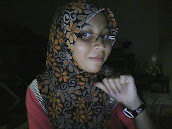
Argghhh!!!! I did not take the examination for the subject of ict, sejarah and sport science. ..so sad!!! I do not know why the week of the test I got fever and flu.. Actually I have the asthma disease . On wednesday night I was attacked by the asthma disease .. ..I can not breathe properly.. help me????!!! ...thank god !!!!! I have medicine that can relieve me of this disease.My mom take care of me that nite. I am so glad and thankful to my mother.. The next day, I have tried to go to school for the examination but my mom did not let me go for fear of more serious.
I hope in the middle of the test I will not sick but healthy and calm during the examination. This is important because half of the year will determine the value T.O.V...I will make sure that I can do the best in the middle test.. hope everyone will pray for my health and success in all areas that I pursue Amin.!!!









































